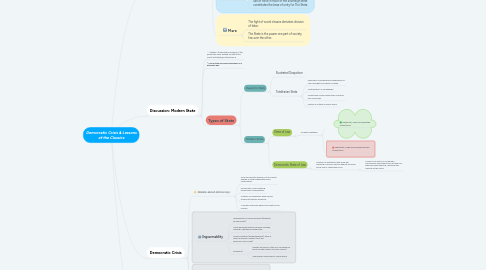
1. Discussion: Nature of the State
1.1. The Problem: Is the form in which politics is being produced changing?
1.1.1. It is thought that politics changes every 10 years
1.2. Machiavelli
1.2.1. Politics is the place in which dominance relationships are born and developed.
1.2.2. The State is the holder of the political power.
1.2.3. The State resolves conflicts between individuals and groups.
1.3. Hobbes
1.3.1. Lacking The State would generate a free-for-all war.
1.3.2. The citizens conceding and renouncing the use of force in favor of the sovereign state constitutes the base of unity for The State.
1.4. Marx
1.4.1. The fight of social classes derivates division of labor.
1.4.2. The State is the power one part of society has over the other.
2. Democratic Crisis
2.1. Debate about democracy:
2.1.1. Small community regimen, but it is being applied to large organizations and corporations.
2.1.2. Democratic control with big bureaucratic organizations.
2.1.3. Citizens' incompetence when facing technical/scientific problems.
2.1.4. Voluntary autonomy against a society of the masses,
2.2. Ungovernability
2.2.1. Disproportion of social demands (powered by democracy)
2.2.2. Social demands present universal suffrage, forming of parties and syndicates.
2.2.3. Forced limitation (authoritarianism), there is never an excess of power (only the governor's lack of skill)
2.2.4. End Result
2.2.4.1. Defeats the idea of State as a convergence point and the solution of social conflict.
2.2.4.2. New powers surge new to corporations.
2.3. Privatization
2.3.1. Offers protection to receive consensus (legitimization) and offers consensus to receive protection (representation).
2.3.2. Representatives (mayors, state deputies, governors, etc.)
2.3.3. Public Services (companies)
2.3.4. Corruption
2.4. Invisible Power
2.4.1. Not a part of the legal regime.
2.4.2. Declarations that the authority is not tied to what it promises, which infringes the legal regime.
3. Discussion: Modern State
3.1. Hobbes: An absolute monopoly of the power has never existed, as well as the social and ideological dominance.
3.2. Each State exercises dominance in a different way.
3.3. Types of State
3.3.1. Despotic State
3.3.1.1. Illustrated Despotism
3.3.1.2. Totalitarian State
3.3.1.2.1. Opposition is prohibited and expression of one's thoughts and ideals is limited.
3.3.1.2.2. Centralization of propaganda.
3.3.1.2.3. Harsh trade controls with other countries and censorship.
3.3.1.2.4. Politics as a state of police affairs.
3.3.2. Modern State
3.3.2.1. State of Law
3.3.2.1.1. A balance between:
3.3.2.2. Democratic State of Law
3.3.2.2.1. Creation of institutions that allow the resolving of social conflicts without recurring to the use of Legitimate Force
4. Conclusion
4.1. The modern democratic regime is characterized by expanding liberties in modern society.
4.1.1. BUT
4.1.1.1. The degree of social developing carries with it great evils that force the citizens into a constant conscientious battle against themselves in order to keep them under control.

